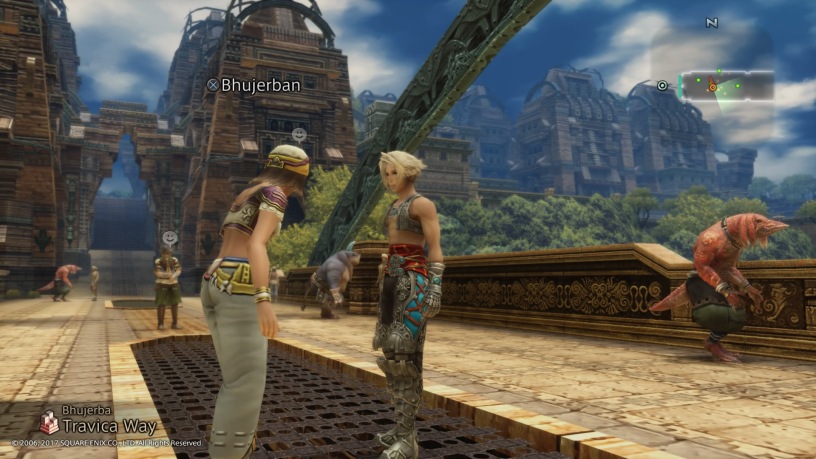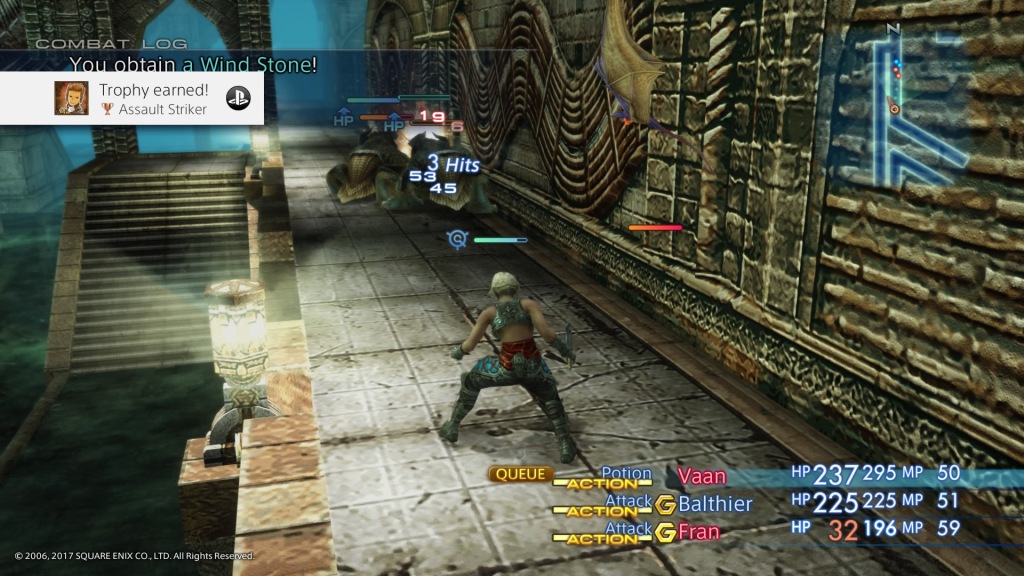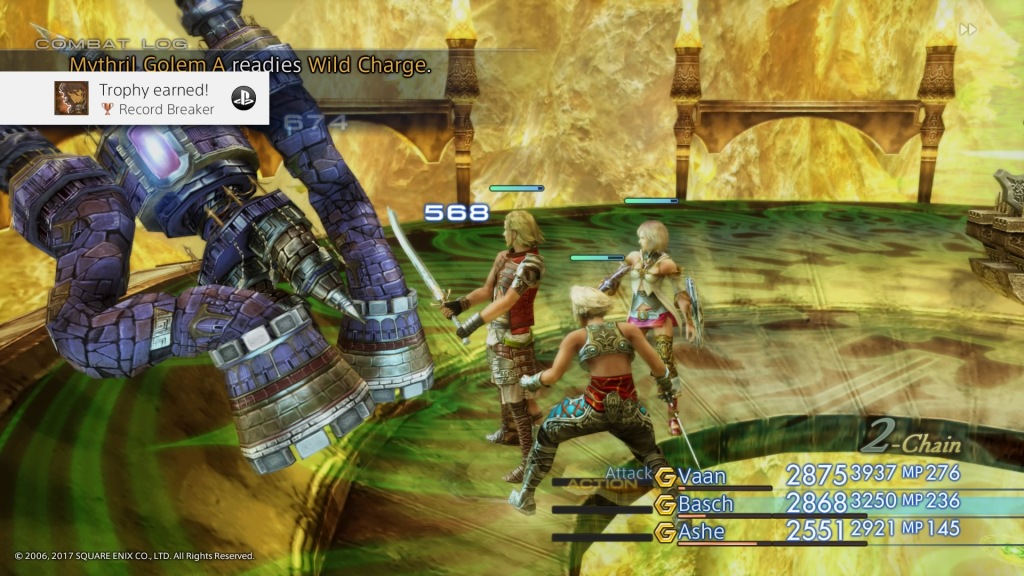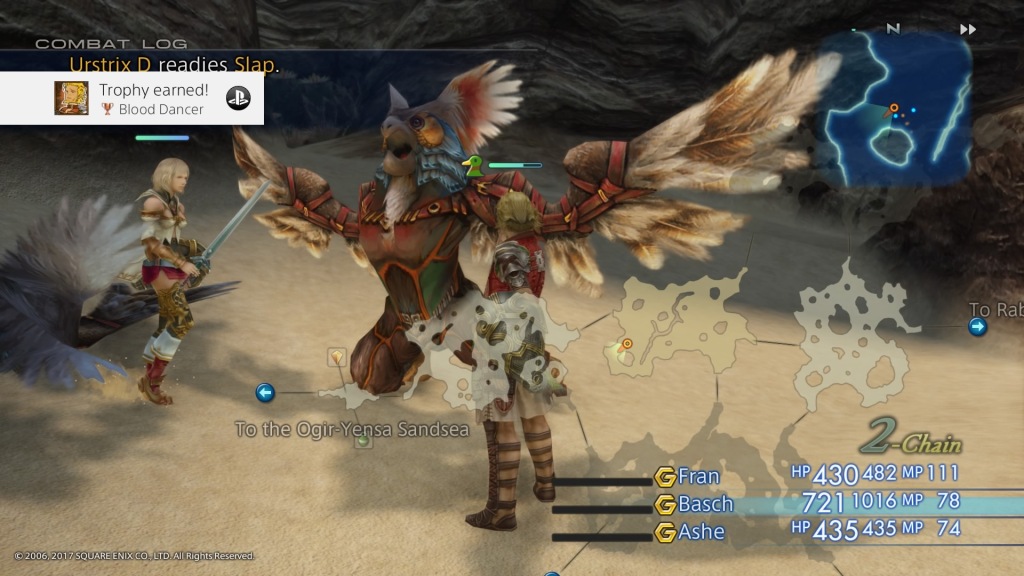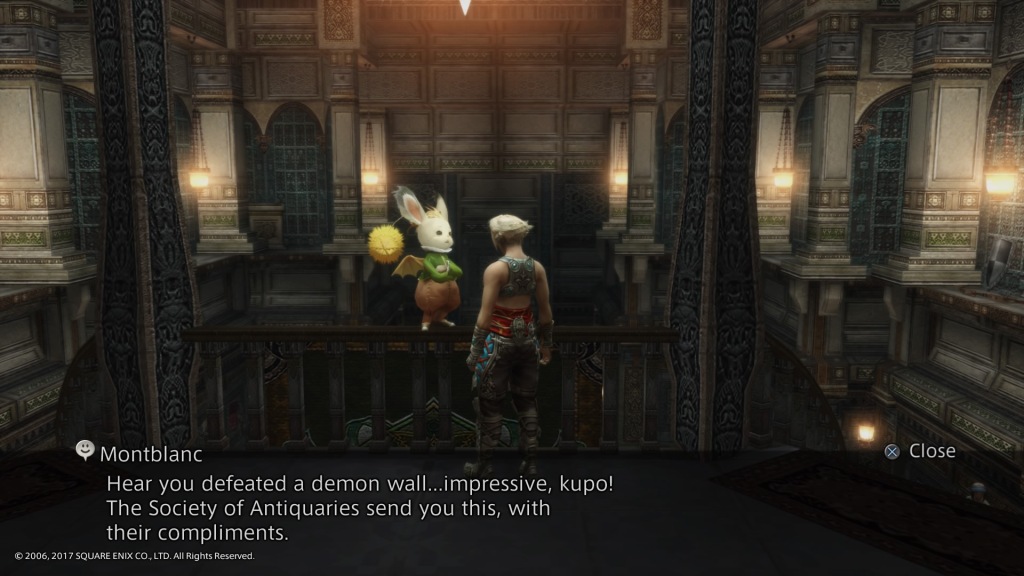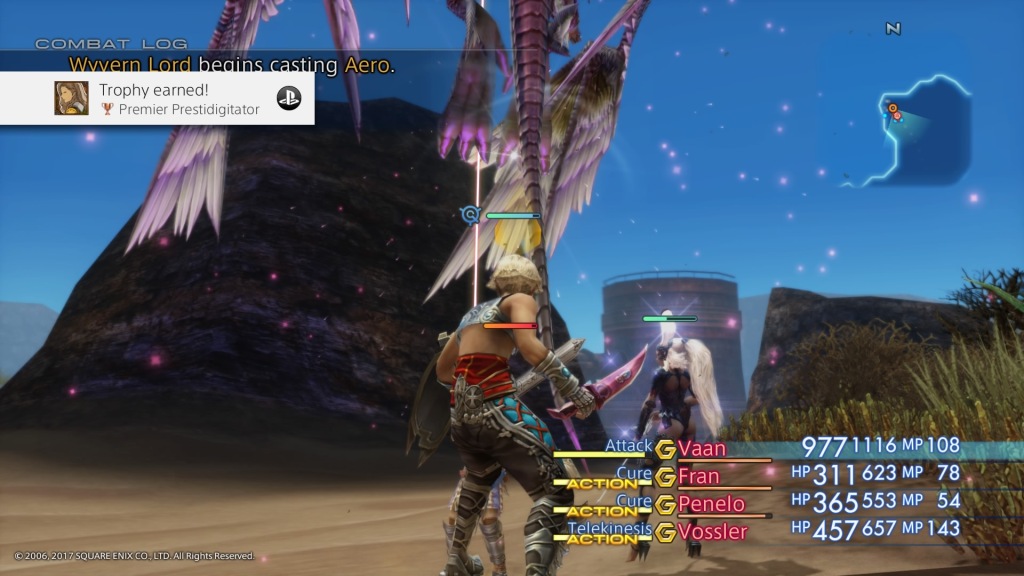Final Fantasy XII was first released for the PlayStation 2 in 2006, with an expanded version being released in Japan the following year. That version was remastered and released worldwide for current consoles in 2017 under the title Final Fantasy XII: The Zodiac Age. The original version received rave reviews, but that doesn’t necessarily mean much: most Final Fantasy games won plaudits in those days, even when they sucked. But having missed it first time round, on account of being a Gamecube rather than PS2 owner, I was excited to finally experience the definitive version of FFXII on PS4.
FFXII introduced numerous innovations to the traditional Final Fantasy formula. Some of these went on to influence future game design, while others simply reflected popular trends in 2000s gaming. Perhaps the most noticeable change was the move from random enemy encounters to fighting enemies on the world map, in the manner of World of Warcraft. This made gameplay much more immediate, and reduced the frustration resulting from high encounter rates that marred so many older RPGs, including FFX and its sequel, FFX-2. Although combat here still involves the selection of commands from a menu system, FFXII’s central innovation, the Gambit System, also allowed the player to set certain behaviours (‘Gambits’), thereby ordering characters to attack enemies in a certain order of priority, cast spells under certain conditions, etc. By automating actions in this way, developer Squaresoft made gameplay less repetitive, and they anticipated the more sophisticated automatic behaviours that mean recent games like Dragon Quest XI are much more enjoyable than any RPG you could have played fifteen or twenty years ago.
That said, the implementation of the Gambit system is somewhat clunky. At first, each character can only have a few Gambits, and the ability to set more for each character has to be unlocked through the game’s levelling system. Moreover, each programmable behaviour has to be purchased individually from in-game vendors. Individually purchasing dozens of Gambits is tiresome, and the workmanlike nature of this business is exacerbated by a surprising scarcity of currency (enemies don’t drop money, just sellable loot). Ultimately, a system which was presumably intended to make the player’s experience easier ends up creating new annoyances, and it would be left to other games to make things more efficient. The same irritations involved in setting up Gambits also mar other parts of the game’s design: spells and armour, for instance, cannot be used as soon as they have been acquired, but only after the character you want to use them has separately acquired a ‘License’ to do so. Surely there’s enough bureaucracy in the real world without introducing more into fantasy RPGs?
FFXII begins extremely well. Set in the world of Ivalice, the opening cutscenes establish an interesting scenario, and the sci-fi/fantasy trappings immediately evoke the atmosphere of the classic Star Wars films. The prologue contains dramatic and surprising action which draws you into the gameworld and helps you become invested in the story before the game starts in earnest in the desert city of Rabanastre. Here, the main character, Vaan, quickly reveals himself as an uninteresting delinquent; but other companions seem more promising, displaying considerable potential for development. While Vaan and his female counterpart, Penelo, are simple street urchins, Ashe is the youthful former princess of Rabanastre, whose husband died tragically in the game’s prologue; Basch, her loyal retainer, is suspected of being responsible for said husband’s death; and Balthier is a charismatic ‘sky pirate’ of mysterious origins, accompanied by the half-human, half-rabbit Fran. Each of these characters has their moments, but after the opening few hours, a striking lack of exposition and dearth of character interaction means they receive less development than the player might naturally expect. As the story hurtles towards its conclusion, we enjoy few insights into the main characters’ emotional or psychological responses. The game’s villain, Vayne Solidor, is also a missed opportunity. Rabanastre’s new governor and representative of the ruling Archadian Empire, Vayne delivers the best moment in the game, a rousing speech to the Rabanastran masses which promises to respect their history and culture but which, one suspects, he will honour in the breach.
The development of FFXII was interrupted by the departure of its lead game director early in the production process, and sadly this means the game’s potential remains largely unrealised. In the end, a one-dimensional plot sees the heroes aiming to secure Rabanastre’s independence while averting war and the use of destructive super-weapons. That the story remains able to hold the player’s attention is almost entirely due to voice actor Gideon Emery’s portrayal of Balthier. The character in his outlines is simply an appealing re-skin of Han Solo, but Emery invests Balthier with irresistible humour and unique, distinctive charm which elevates him to the first rank of video game heroes. Voice acting was still in its relative infancy when this game was first ported to the West: and while the overall quality represents an improvement compared to Final Fantasy X, most of the acting still ranges from the merely decent (Ashe, Basch) to the downright poor (Vaan). Emery’s performance was in another class, anticipating the much higher quality of voice acting that we benefit from today.
Final Fantasy games have generally boasted impressive graphics and music, and this is largely true of FFXII. The PS2-era graphics have seen a good upgrade for the PS4, so while this never looks like a truly contemporary RPG, the character models and environments are perfectly serviceable. The fantasy setting is at least somewhat distinctive: and where FFX used a Pacific Island aesthetic, FFXII’s settlements blend Star Wars with the Ottoman Empire. Unfortunately, the worldbuilding is not immersive or engaging enough to really draw you into the lives and culture of the people who live in these visually arresting cities. The series’ trademark Full Motion Video cutscenes are absorbing, but beyond the opening sequences, these are relatively infrequent, and tend to consist of aircraft dogfights or establishing shots of enormous buildings. Meanwhile, the soundtrack is perfectly adequate without being memorable, and it pales in comparison to earlier Final Fantasy scores such as FFVI and FFVIII. Notably, iconic composer Nobuo Uematsu only composed one track, ‘Kiss Me Goodbye’, which serves as the ending song and is probably the game’s best.
Gameplay sees the player control one of six party members as they explore various environments spread across the continent of Ivalice. There are a few large settlements and a number of smaller camps where players can buy items and initiate side quests, with the rest of the game world being ‘wild’ and inhabited by large numbers of monsters. Side quests comprise short narrative encounters as well as monster assassination missions called ‘Hunts’. Unfortunately, these are all introduced in a cumbersome manner, and the game’s map does not feature any markers to identify those among the vast array of NPCs who have quests to offer. Once activated, most quests involve little besides ferrying items from one place to another. Rewards are generally worthless, and overall these quests offer little in the way of enjoyment or practical utility.
Hunts at first seem more promising, and are introduced to the player with some ceremony. But once again, the unwieldy process by which you acquire and report Hunts means few contemporary players are likely to have the patience to see them through. In order to learn about a Hunt, you have to check a central noticeboard, which then directs you to speak to an NPC somewhere in Ivalice (often in another town, or even the middle of nowhere). Only after speaking to this NPC can you actually proceed with the Hunt. Once the monster has been killed, you must manually report to the NPC to turn in the quest. All this is made even more onerous because FFXII lacks a proper fast-travel system: you can only fast-travel between a few key hubs, and doing so requires the consumption of moderately rare Teleport Stones. You also have to contend against the fact that some monsters only appear under particular conditions, and have a low spawn rate; making the process of finding them laughably onerous. Moreover, there’s little guidance regarding what level your party should be in order to complete a Hunt, and most Hunts become available much earlier than you can realistically expect to complete them, inevitably leading to a few Game Over screens. The icing on this unappetizing cake is that the rewards for completing Hunts are usually trash. All in all, there’s really no good reason to bother with them.
With a lacklustre main story and irrelevant side content, FFXII holds little in the way of conventional appeal by the time the player has reached the midgame. At this point, the levelling system becomes one of the few sources of interest. While characters gain experience and level up through combat, more meaningful increases in power come via the Job System. Each character can have two Jobs (or classes), and it’s possible to assign any of the game’s twelve Jobs in whatever combination you choose. This allows an infinite amount of customization, and it can be quite fun to mix and match skills, even if most of your units will eventually adhere to traditional RPG archetypes.
It’s also possible to recruit ‘Espers’, powerful supernatural beings who can fight in the party’s stead for a period of time. Some Espers are recruited during the story, while others can be discovered by exploring optional dungeons. These correspond to the Espers and Guardian Forces found in other Final Fantasy games, but in comparison are sadly lacking in both character and usefulness. Each party member can also acquire ‘Mist’ skills, allowing them to perform special combat attacks reminiscent of Limit Break attacks in FFVIII or FFX. But where those games invited the player to complete some kind of minigame, FFXII just asks you to complete a QTE in order to chain Mist attacks. It’s yet another example of transforming a potentially dynamic system into something boring and rote.
Considering all these complaints about story, pacing, mechanics, and gameplay, it would be easy to think that FFXII is an unlikeable game. Yet the move away from random combat encounters invites lenity, while the presence of a ‘fast-forward’ feature also makes it easier to forgive the aforementioned multitude of sins. At the flick of a button, exploration and combat can be sped up to four times the default pace, making it much easier to tear through the perfunctory story. This meant I could complete the game in just over forty hours, the first half of which was spent playing ‘normally’. Alongside Gideon Emery’s outstanding turn as Balthier, these quality of life features mean that FFXII is a hard game to dislike, despite its flaws. But it’s damning enough when one of a game’s most praiseworthy qualities is the ability to get it over with as quickly as possible.
6/10
